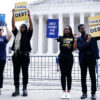As North Korea shows no signs of halting its missile test slated for this week, it is easy to forget that North Korean leader Kim Jong-un has been in power less than four months—tumultuously, even prematurely, thrust into the spotlight after the death of his father, Kim Jong-il.
So far, the leadership transition appears relatively stable, according to Heritage’s Bruce Klingner. The North Korean Workers’ Party (KWP) assembly tomorrow should bestow Kim Jong-un with more titles, such as Chairman of the National Defense Commission, General Secretary of the KWP, and Presidium Member of the KWP Political Bureau, all to further strengthen his credibility.
Yet, even a stable leadership transition does not guarantee regional stability, argues Klingner. After all, the upcoming missile launch—flagrantly disregarding the February 29 agreement with the U.S.—comes despite Jong-un’s effective succession.
This leads to a key point. Klingner writes that “whether ruled by Kim Jong-un, another viable despot, or a collective leadership, North Korea’s current policies—aggression abroad and repression at home—will continue.” In other words, different leader, same policies—most apparent in Jong-un’s affirmation of Songun (military-first policy), lack of interest in improving relations withSouth Korea, and brutal purges to ensure domestic stabilization.
Despite a relatively smooth transition, myriad challenges still exist for Jong-un’s consolidation of power. After all, as Klingner asserts, he is “but a pale reflection of his father and grandfather,” lacking the experience of the previous leaders. The potential for a popular uprising is low but increasing. Amplified exposure to the outside world threatens North Korea’s monopoly of information, and although a bottom-up Korean “Arab Spring” is unlikely for various reasons, maintaining power will certainly test the young Kim’s bona fides.
The resulting fear is that, to further legitimize his claim, Jong-un will increase purges and elevate his confrontational foreign policy, as evidenced by the upcoming missile launch. In fact, Klingner argues that Jong-un “will be as aggressive as his father Kim Jong-il—perhaps even more so. Consequently, even a stable North Koreawill continue to sow chaos throughout the region.” This aggression could prove catastrophic, given Jong-un’s lack of experience—after all, he directed the attacks on the Cheonan and Yeonpyeong Island, which, in the future, could provoke retaliation from South Korea. His inexperience could cause Kim to “stumble over a policy redline,” according to Klingner.
With that in mind, Klingner provides several predictions for North Korea’s actions in 2012. Domestically, look for Kim Jong-un to further consolidate his leadership succession with the KWP Assembly on April 11, the Supreme Assembly on the 13th, and Kim Il-sung’s 100th birthday on the 15th. Abroad, North Korea will hope for a liberal victory in South Korea’s legislative election, avoiding conflict until after the election. Pyongyang will attempt to garner more aid from the international community, particularly the U.S., and conduct another nuclear test to pressure the United States and its allies to return to negotiations.
Washington and its allies must be prepared to enact a list of policies—ranging from additional punishment to negotiations to missile defense—if such provocation occurs. If North Korea carries out its planned missile test, Klingner believes the U.S. should suspend all shipments of nutritional aid and have the U.N. Security Council impose stricter sanctions onNorth Korea with stricter enforcement by all nations.
Punitive measures work best in conjunction with diplomacy, but the latter must be based on principles of conditionality, reciprocity, and transparency. North Korea’s rapid breaking of the February 29 agreement will make the Obama Administration even more wary of engaging with Pyongyang, particularly in an election year.
Because even a comprehensive strategy using all the instruments of national power is unlikely to get North Korea to abandon its nuclear weapons, Klingner advocates the United States taking steps to defend itself by developing multilateral contingency plans for effective crisis response in conjunction with Japan and South Korea. Moreover, the U.S. must maintain a robust forward-deployed military presence in South Korea and Japan and fully fund U.S. defense requirements. Continuing missile defense development and encouraging Japan to maintain its missile defense plans are critical vis-à-vis North Korea’s ballistic missiles.
North Korea will continue to dominate the headlines in 2012, as uncertainties over its leadership transition increase the risk of miscalculation and conflict. Yet the world need not be held hostage to a despot and a few nuclear weapons—there exist clear steps that the U.S., its allies, and peace-minded nations can take to neutralize and ultimately diminish the North Korean threat.


























